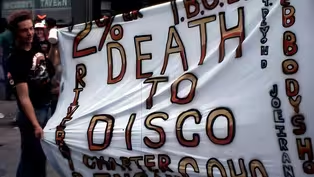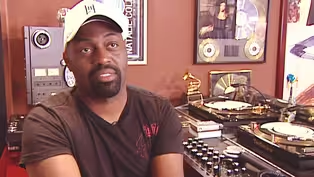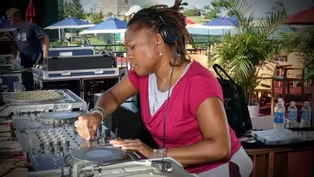Chicago Stories
The Origins of House Music
Clip: 11/8/2024 | 8m 56sVideo has Closed Captions
A group of Chicago friends plant the seeds of house music.
In search of a party scene like the one they encountered at New York’s warehouse parties, a group of Chicago friends plant the seeds for house music.
Problems playing video? | Closed Captioning Feedback
Problems playing video? | Closed Captioning Feedback
Chicago Stories is a local public television program presented by WTTW
Lead support for CHICAGO STORIES is provided by The Negaunee Foundation. Major support is provided by the Abra Prentice Foundation, Inc. and the TAWANI Foundation.
Chicago Stories
The Origins of House Music
Clip: 11/8/2024 | 8m 56sVideo has Closed Captions
In search of a party scene like the one they encountered at New York’s warehouse parties, a group of Chicago friends plant the seeds for house music.
Problems playing video? | Closed Captioning Feedback
How to Watch Chicago Stories
Chicago Stories is available to stream on pbs.org and the free PBS App, available on iPhone, Apple TV, Android TV, Android smartphones, Amazon Fire TV, Amazon Fire Tablet, Roku, Samsung Smart TV, and Vizio.
Providing Support for PBS.org
Learn Moreabout PBS online sponsorship- [Narrator] In 1974, a young gay group of friends, Donald Crossley, Michael Matthews, and Vickie Jones wanted to experience the disco scene sweeping the nation.
They headed to Chicago's premiere gay disco tech, Dugan's Bistro, thought to rival New York's Studio 54.
But Dugan's Bistro catered to a predominantly white crowd and was not welcoming to African Americans.
- There was a guy that worked at the door.
He would give us a hard time getting in.
- [Narrator] So the group traveled to New York City to David Mancuso's iconic loft party.
- When we got into that David's loft, it was like going into another world.
Everybody was dancing, the music was blasting all over the place.
It was just such a different feeling of not having known what that was like, being here in Chicago.
- [Narrator] They fell in love with the freedom, the openness, the energy.
They couldn't stay away.
- I said, "Nobody here has any parties like the ones they have in New York."
And my mother said, "Why can't y'all just have parties here?"
And a little light bulb pops up in my head.
I'm thinking, "Wait a minute, she's got a point."
- [Narrator] Crossley and friends formed a social group, calling themselves US Studio.
They planned to use their own apartments to throw loft-style disco parties that replicated the New York experience.
- And we also said, we really don't have any money.
And Ziggy said, "Well, I'll give you guys $500."
- [Narrator] Longtime friend Ziggy Schuh, a gay violin maker from Germany, offered to pay for the equipment.
He would become US Studio's financier.
They promoted the party by passing out handmade flyers.
- We only wanted a certain type of clientele.
- [Narrator] The word of mouth campaign worked and the crowd poured in.
- It had to be almost 500 people.
We never expected a crowd like that.
- [Narrator] The event proved that Chicagoans had a thirst for the same type of parties New York provided, where a mostly gay Black and Latino crowd could dance and enjoy a freedom they had never known.
US Studio began hosting parties around the city.
twice a month.
Partygoers followed.
But as their profile grew, the group attracted unwanted attention.
According to Crossley, a couple of mob enforcers showed up at a party on Clinton Street and demanded payment for hosting a party in their area.
Donald and Vickie explained that they had already paid for the space.
- And the guy says, "Well, you're not understanding what I'm saying.
People have parties here and they can pay for it."
I said, "We're not paying nobody for nothing.
I know what this is all about."
And Vickie and I walked away and we went on inside.
Next morning, my brother comes upstairs, he had a newspaper in his hand, and the newspaper said, "Loft on fire."
It was burned to the ground.
- [Narrator] Their space and equipment was destroyed, as was their sense of security.
But their desire to gather was undaunted.
In late 1974, US Studio found a new home in the city's warehouse district at 555 West Adams.
- But you would hear people saying, "I'm going to the Warehouse.
You going to the Warehouse?
You going to the Warehouse tonight?"
And everybody just wanted to call it that.
- [Narrator] And the Warehouse was born, creating a new disco party scene in Chicago, and DJ Michael Matthews was at the center of it all.
- Michael Matthews was the DJ that actually started the movement here in Chicago and never gets credit.
(upbeat music) One party in particular, the people had partied so hard that at the end of the party, they all started clapping and he looked at me and said, "What are they doing?"
I said, "They giving you a standing ovation."
- [Narrator] US Studio's Warehouse parties quickly became the place to be.
- So that's where we, well, that's where they began.
I was really a tag along at that point.
I wasn't part of the social club.
- [Narrator] Robert Williams, a veteran of the New York Club scene, saw the social club as a great business opportunity.
- I decided, "Well, this is a nice little setup they have."
So I decided to incorporate it as a real business.
- [Narrator] But disagreements about dues, titles, and admission fees started almost immediately.
After two years of infighting, they split.
- So at that point, we just decided that this is not working for us.
We didn't think anything about we leaving a future business or how big this was gonna be, but we were a bunch of friends who just wanted to have a party.
- [Narrator] Donald, Michael, and Vickie left the organization they started to Robert and Ziggy and launched a new club called The Bowery.
They hosted high glamour theme parties and the crowd followed.
- [Donald] Nobody was going to the Warehouse, everybody was coming to the Bowery.
- We were a little depressed because we were like, "Mm, we might be really out of business here."
- [Narrator] Robert and Ziggy needed a powerhouse DJ to lure the crowd back to the Warehouse.
Robert headed east to ask New York City's top disco DJ, Larry Levan, to come to Chicago.
- And he told me no.
- Larry said absolutely not.
He had no intentions of leaving New York City.
But Larry kept saying, "You should take Frankie, 'cause he doesn't have a job now."
And I was their second choice.
(upbeat music) - [Narrator] Frankie Knuckles would eventually be crowned the godfather of house music, but in 1977, he was a 22-year-old art student who was making a name for himself as a DJ on the New York scene.
Williams lured Knuckles with a promise of a three-story club in downtown Chicago, complete with the best sound system money could buy.
- And then they offered me the residency and a part of the business, as an incentive, and I went back home and thought about it, made the move.
- [Narrator] The new Warehouse opened its doors at 206 South Jefferson in March of 1977, featuring Frankie Knuckles as its resident DJ.
- And I played for the grand opening.
It was fabulous.
Everybody came out.
The place was packed.
There was a line down the street.
(upbeat music) - [Narrator] But after the grand opening, no one came back.
- There was no one going there at all.
Somehow, we ended up losing the audience.
- [Narrator] Over at the Bowery, the parties were booming.
♪ All right, y'all ♪ ♪ Yeah, here we go ♪ ♪ Tell 'em man, yeah ♪ ♪ Woo, yeah ♪ - Our name had gotten out so much that we were getting a lot of people that were coming from New York.
We had kind of arrived.
We had no competition.
We didn't think anything about the Warehouse.
- [Narrator] Desperate to bring a crowd to the Warehouse, Knuckles looked for other gigs around town to raise his profile.
- None of the white clubs were hiring any Black DJs.
Black, you know, I mean gay or straight.
It just wasn't done back then.
- [Narrator] With the Warehouse on the verge of collapse, DJ Michael Matthews made a kind gesture that would change the world of music.
- Only thing that saved us was Michael.
He invited Frankie to come to the Bowery and play.
- And everybody loved him.
- [Narrator] At the Bowery, the crowd went wild for Knuckles.
He soon built an audience at the Warehouse.
- People just rushed to him like he was a celebrity.
(upbeat music) - Disco signals the shift of the DJ as a performer, not just somebody who is playing a record and then switching to another record, but creating a tapestry of sound
Video has Closed Captions
Clip: 11/8/2024 | 3m 47s | An anti-disco movement spurs the development of house music. (3m 47s)
From the WTTW Archives: An Interview with Frankie Knuckles
Video has Closed Captions
Clip: 11/8/2024 | 3m 27s | DJ Frankie Knuckles discusses the early days of house music at the Warehouse in this 2004 interview. (3m 27s)
Video has Closed Captions
Clip: 11/8/2024 | 5m 13s | Women were not always welcome as house music DJs. (5m 13s)
Providing Support for PBS.org
Learn Moreabout PBS online sponsorshipSupport for PBS provided by:
Chicago Stories is a local public television program presented by WTTW
Lead support for CHICAGO STORIES is provided by The Negaunee Foundation. Major support is provided by the Abra Prentice Foundation, Inc. and the TAWANI Foundation.


















